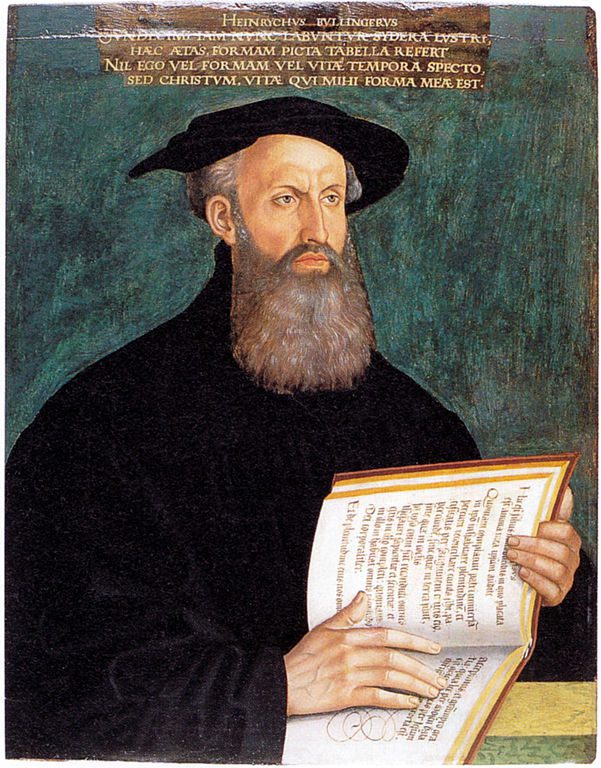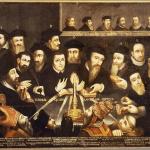
Heinrich Bullinger (1504-1575) succeeded Zwingli as chief pastor of Zurich, Switzerland, and is widely regarded as the most moderate and tolerant of all the Protestant Founders. He was the author of the Second Helvetic Confession of 1566, and was an aide to Queen Elizabeth of England. Bullinger was also assuredly an anti-Catholic, as were all the so-called “reformers” (to different degrees). Indisputable evidence for that comes from his work Decades (fifty sermons). In the fifth “decade,” second sermon, “On the Unity of the Church” (1551) he writes:
For freely we confess, and with great joy giving thanks to God that hath delivered us we publish abroad, that we are departed from the Romish church, and that we do at this day abhor the same. But first of all we distinguish and put a diversity between the old church of Rome and the late upstart church. For there was sometime at Rome a holy and faithful church, which apostolic men and the apostles of Christ themselves did establish and preserve by the word of God: which ancient church was not only without the ceremonies there used and received at this day, but if she had but seen them, she would have accursed them. . . .
That ancient church wanted the decrees whereupon the church of Rome at this day altogether stayeth herself. She was ignorant of that monarchy and all that stately court. Therefore from that ancient and apostolic church of Rome we never departed, neither will we ever depart.
. . . Finally, we do not acknowledge that upstart church of Rome to be the true church of Christ, which doth acknowledge and worship the pope as Christ his vicar in earth, and is obedient to his laws. Wherefore we cannot be schismatics, who, leaving the church of Rome, have not departed from the true church of God. . . .
The godly bear many things in the church, that is to say, in the members of the church and in the ministers (as I shewed of late when I entreated against the schismatics); but in that upstart church of Rome, thou shalt not find small and tolerable faults either of doctrine or of life or of errors: all these faults in her are heinous, desperate, and abominable. What manner of charity should it be therefore that could hope for better of the most untoward and lamentable things? Hypocrites and evil men are accounted to be parcel of the outward and visible church of God, and are suffered in the same: but these Romanists are neither evil men or hypocrites, but the very worst of the most cruel enemies of Christ his truth, openly blaspheming the gospel and persecuting those that believe in Christ; and therefore they have neither the outward, nor yet inward marks of the church. . . .
We acknowledge, moreover, all that are at Rome, who at this day do worship Christ and keep themselves from all popish pollution, to be our beloved brethren; of which sort we doubt not but Rome hath a great many. . . . Moreover, God could undoubtedly reserve to himself a mighty church even under the papism; even as we doubt not but hath done a very great under Mahometanism: for who will think that no members of the church of God are remaining in all Asia and Africa? . . .
We know moreover that we ourselves, which at this day believe in Christ, are the true church of Christ our Lord: for we cleave by faith to our only head Christ and to all the members of the catholic church; so we are not destitute of the true marks of the true church of God.
The first sermon in this fifth decade is entitled “Of the Holy Catholic Church.” Here is a portion:
Today we do not acknowledge the upstart Romish church of the pope (we are not speaking now of the old apostolic Church) to be the true Church of Christ, but we do not rebaptize those who were baptized by priests imbued with popish corruption, for we know that they are baptized with the baptism of Christ’s Church and not of the pope, in the name of the Holy Trinity, to the articles of the catholic faith, not to errors and superstitions and papistical impieties . . . we do not refuse the Lord’s Prayer or the Apostles’ Creed or finally the canonical Scriptures themselves simply because the Romish church also uses them, for that church does not have them of itself, but received them from the true Church of God . . . the true Church of Christ. (from Zwingli and Bullinger, edited by G. W. Bromiley, Philadephia: Westminster Press, 1953, 304)
Editor Bromiley describes Bullinger’s opinion of the (“Roman”; oops, sorry: “Romish”) Catholic Church (p. 286):
The attitude of Bullinger to the Roman church is in a sense equivocal. In so far as Rome has preserved the forms of the Church, the Word of God and the sacraments, he finds it difficult to deny it all claim to be counted as a true Church. But in so far as it has perverted the true faith he has no option but to identify it as the church of the devil rather than the Church of Christ. The champions of the papacy are hypocrites in the sense that the Pharisees were, that is, they trust in their own righteousness of works rather than in the righteousness imputed by faith in Jesus Christ . . . The papal claims to inerrancy, overlordship and apostolicity are flatly rejected.
***
(originally 1-16-07)
Photo credit: Heinrich Bullinger (1550), by Hans Asper (1499-1571) [public domain / Wikimedia Commons]
***













